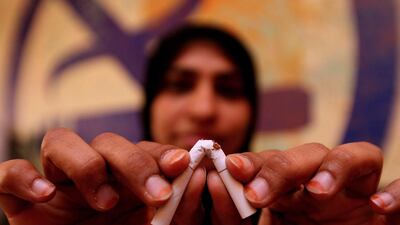ABU DHABI // Smokers appear to be a dying breed in the UAE.
By far most people in the survey deny using any form of tobacco, despite experts saying it is still common among Emiratis and expatriates.
“People may deny smoking in a general survey but they don’t lie in front of a doctor,” says Dr Sajeev Nair, a specialist pulmonologist at LLH Mussaffah.
“Smoking is very prevalent in the UAE. My colleagues and I often discuss whether more people are smoking nowadays compared to earlier, and we think that it is increasing slowly among the younger people.
“They are able to access tobacco easily.”
Almost four in five respondents (76 per cent) say they do not smoke cigarettes or shisha pipes.
The incidence is even lower for cigars, where 91 per cent claim not to smoke them.
Of those who do admit to using shisha, only 3 per cent say they smoke every day, while 16 per cent of those who use cigarettes say they do so each day. But Dr Nair says he has patients as young as 18 suffering from lung problems from tobacco use.
“Many of them suffer from upper respiratory tract infections as they are smokers,” he says. “Between 70 and 75 per cent of my patients are smokers.
“One of my patients who was 18 years old had suffered from wheezing as a child. His symptoms had disappeared but he started smoking and his wheezing redeveloped.
“Smoking can cause recurrence of wheezing in asthmatic kids and also worsen it.”
Dr Nair has welcomed a string of anti-tobacco measures across the UAE to curb smoking.
They include strict rules curbing tobacco sales and advertising, graphic warnings placed on cigarette packs, laws that make it illegal to smoke in a vehicle when a child under 12 is present, and banning cigarette sales to those under 18.
Dr Nair believes this will cut the prevalence of smokers and its effects will soon be felt.
He gives the example of Kerala in India, where smoking was banned in public places eight years ago and selling tobacco to those under 18 was prohibited.
“There was a huge reduction in sale of tobacco products after this legislation was introduced,” Dr Nair says.
“In the case of the UAE, the legislation will also have an effect but we should remember that it takes three to four years to measure the effect.”
Dr Wedad Al Maidoor, head of the National Tobacco Control Programme at the Ministry of Health, welcomes the figures suggesting smoking is falling out of favour.
“I think we should be encouraged by the results,” Dr Al Maidoor says. “We also need to continue our efforts to raise awareness about the harmful effects of smoking, because awareness is more important than enforcing more rules and regulations.
“If people are not aware of how dangerous smoking is we can put rules and legislation in place, but people will go back to smoking.”
She says preventing smoking in closed public places is a huge deterrent to tobacco users and leads many to kick the habit.
Rakesh Darshan, 31, an Abu Dhabi resident rom Nepal, used to smoke but quit six months ago.
“I work out nowadays,” Mr Darshan says, adding that smoking “is not beneficial for the health”.
The guest services worker at the Ritz-Carlton Abu Dhabi used to smoke up to 15 cigarettes a day.
Anti-tobacco measures, especially labels saying “smoking kills” on cigarettes packets, are a deterrent, Mr Darshan says.
“They are advertising in a negative way.”
The survey found 31 per cent of men smoke cigarettes, compared with 13 per cent of women.
And 19 per cent of male smokers say they smoke cigarettes several times a day, compared with only 4 per cent of women.
The World Health Organisation says tobacco is one of the biggest public health threats the world has ever faced, killing nearly 6 million people a year.
One person dies of tobacco-related illnesses about every six seconds, accounting for one in 10 adult deaths.
jbell@thenational.ae
arizvi2@thenational.ae

